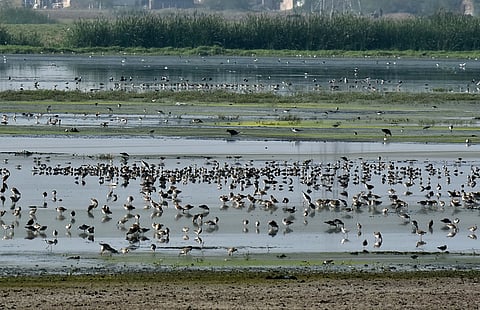

CHENNAI: Tamil Nadu, which has the highest of 20 Ramsar sites in the country, has not availed of funds from the union government under the National Plan for Conservation of Aquatic Ecosystems (NPCA) for the protection of these sites in the last five years, according to official data presented in the Lok Sabha.
This is primarily due to the state’s delay in preparing Integrated Management Plans (IMPs) for the sites, a prerequisite for the release of funds.
While the union government had allocated Rs 44.84 crore over five years for conservation and management of 27 Ramsar sites across different states, Tamil Nadu received its last funding in 2019-20, amounting to Rs 1.37 crore.
In contrast, states like Odisha (Rs 5.37 cr in 2020-21), Mizoram (Rs 1.54 cr in 2021-22), and Jammu & Kashmir (Rs 9 cr in 2022-23) have benefited significantly from the NPCA fund.
Supriya Sahu, additional chief secretary, Environment, Climate Change, and Forest Department, explained the reason for the funding gap. “During 2019-20, Point Calimere was the only Ramsar site in Tamil Nadu. The remaining 19 wetlands were notified as Ramsar sites only after 2022-23. The IMPs are a prerequisite for NPCA funding, and Tamil Nadu will seek funds after receiving formal approval from the Government of India.”
With the recent addition of Sakkarakottai Bird Sanctuary and Therthangal Bird Sanctuary, both located in Ramanathapuram district, Tamil Nadu has 20 Ramsar sites.
Deepak Srivastava, former member secretary of Tamil Nadu Wetlands Mission, who retired last month, said a work order for preparing IMPs for three Ramsar sites has been issued to the Bengaluru-based Ashoka Trust for Research in Ecology and the Environment (ATREE). So far, 14 IMPs have been completed, with 13 prepared by the Salim Ali Centre for Ornithology and Natural History (SACON) and one by GIZ, a German development agency.
The State Wetlands Authority, chaired by the forest minister, has to be convened, after which approved IMPs will be forwarded to the union environment ministry for funding under NPCA.Kirti Vardhan Singh, MoS in the union environment ministry, said in his reply in the Lok Sabha, besides NPCA, wetland conservation efforts are also supported through initiatives such as the Amrit Dharohar initiative, launched in 2023.
This focuses on species and habitat conservation, nature tourism, and wetland-based livelihoods. However, conservationists argue that direct funding under NPCA is essential to ensure sustained protection of these ecologically sensitive areas. The Wetlands (Conservation and Management) Rules, 2017, prohibit activities such as waste dumping and discharge of effluents in these wetlands. However, implementation remains a challenge without adequate financial resources.